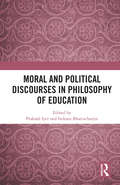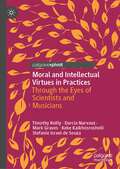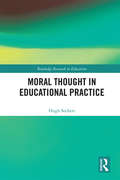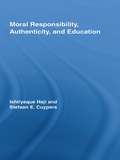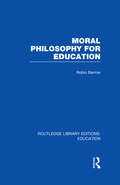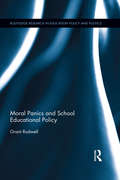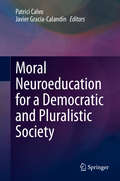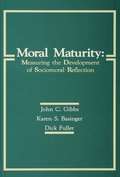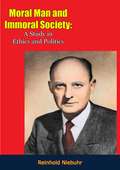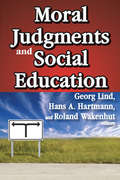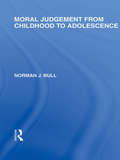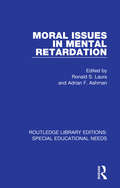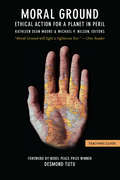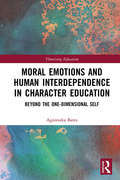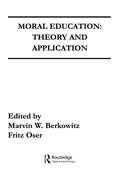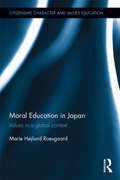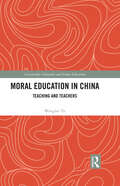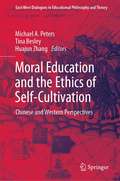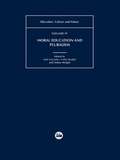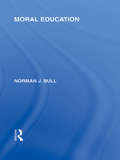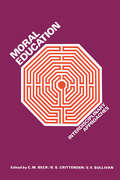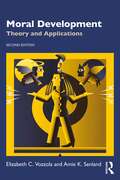- Table View
- List View
Moral and Political Discourses in Philosophy of Education
by Prakash Iyer Indrani BhattacharjeeThis book focuses on moral and political education and critically engages with educational issues from a philosophical perspective. It engages with questions of moral education as well as questions about citizenship education, to address apprehensions on learning in a liberal democracy while parallelly invoking issues from within the curriculum, the school environment and teacher-student relationship. With contributions from renowned philosophers and educationists, this volume discusses themes like civic education and liberal democracy; toleration and freedom; Tagore’s conception of the moral and political self; key issues in moral education; cosmopolitanism, compassion, care ethics and moral purpose of schooling; to revisit and rethink some foundational questions related to education, curriculum and pedagogy. This volume will be essential reading for educationists and educators and will be important for scholars and researchers of philosophy of education, education, teacher education and school education.
Moral and Intellectual Virtues in Practices: Through the Eyes of Scientists and Musicians
by Darcia Narvaez Mark Graves Timothy Reilly Keke Kaikhosroshvili Stefanie Israel de SouzaThis book provides an integrative interdisciplinary view of how intellectual and moral virtues are understood in two separate practices, science and music. The authors engage with philosophical and psychological accounts of virtue to understand scientists’ and musicians’ understandings of intellectual and moral virtues. They present empirical evidence substantiating the MacIntyrean claim that traditions and practices are central to understanding the virtues."
Moral Thought in Educational Practice: The Primacy of Moral Matters for Teaching and Learning (Routledge Research in Education #30)
by Hugh SockettThis book demonstrates how pervasive moral thought can be in educational thought and practice. By analyzing research on the moral and intellectual qualities in curriculum, as well as the integration of personhood and citizenship development in classroom work, this book demonstrates the primacy of the moral in various educational settings. With an additional emphasis on morality as it pertains to teaching as a vocation, Moral Thought in Educational Practice examines the objectives of teacher education and offers an account of moral purposes within the knowledge base for teaching.
Moral Responsibility, Authenticity, and Education (Routledge International Studies in the Philosophy of Education)
by Stefaan E. Cuypers Ishtiyaque HajiThe primary purpose of this book is to explain the distinction, on the one hand, between indoctrination and education, and, on the other, between responsibility-subverting manipulation and mere causation. Both are elucidated by an appeal to common ground, an account of when our motivations and other springs of action are "truly our own" or "authentic." The book progresses from analyses of the sort of agency that responsibility requires and the authenticity of our motivations, together with a discussion of the relevance of these analyses to manipulation and related problems in the philosophy of education, to a defense of the thesis that responsibility from love's standpoint is of vital significance, and the implications of this thesis for what the authors deem to be legitimate goals of education and other issues in free will. Philosophers and advanced students working in free will, moral psychology, and the philosophy of education will find this text to be extremely useful.
Moral Philosophy for Education (Routledge Library Editions: Education)
by Robin BarrowTeachers and students are frequently confused as to the relevance of abstract philosophical theorising to the reality of the classroom and this book is distinctive for the attention it devotes to philosophy and its potential contribution to practical matters, and education in particular. The author is critical of many current views of the philosophy of education and argues the validity of philosophy as an integral part of education in its own right, against the creation of a ‘new’ branch of philosophy, the ‘philosophy of education’. The book stresses that relativist ethical theories are no more ‘known’ to be valid than the absolutist theories they have replaced, and in the second section the author argues for a modified utilitarian position. The final section enables the reader to relate the general argument of the second part to several specific issues.
Moral Panics and School Educational Policy (Routledge Research in Education Policy and Politics)
by Grant RodwellHow do the moral panics that have plagued school education since it’s nineteenth-century beginnings impact current school education policy? Research has shown young people to be particularly vulnerable to moral panics and, with the rise of social media, the impact of moral panics on school education is growing exponentially. Increasingly, they are reaching into the highest levels of national governments and, so powerful are their effects, some politicians choose to orchestrate them for their own political ends. For many educational administrators, the management of the ‘fallout’ of moral panics has become a time-consuming part of their day, as well as being a problematic time for parents, teachers and students. First developed by British and Canadian sociologists such as Stanley Cohen (1972), moral panic theory has evolved substantially since its early focus on adolescent deviant behaviour, and is now a part of common media talk. This book addresses the need for a single monograph on the topic, with reference to historical moral panics such as those associated with sexuality education, but also wider societal moral panics such as those associated with obesity. Teachers, students, indeed all members of school communities, along with educational administrators and politicians can learn from this study of the impact of moral panics on school educational policy.
Moral Neuroeducation for a Democratic and Pluralistic Society
by Patrici Calvo Javier Gracia-CalandínThis book brings together a group of top scholars on ethics and moral neuroeducation to cover the specific field of moral learning. Although there are many studies on neural bases of human learning and the application processes in different fields of human activity, such as education, economics or politics, very few of them have delved into the specific field of moral learning. This book brings forward a discursive and cordial ethical concept suitable for the theoretical-practical development of moral neuroeducation, as well as a set of guidelines for the design of an educational model that, based on moral neuroeducation, contributes to the resolution of social problems and the eradication of undesirable patterns and behaviors such as hate speech, corruption, intolerance, nepotism, aporophobia or xenophobia. Furthermore it contains a management approach for the application of this educational model to the different areas of activity involved in social and human development. A must read for students, educators and researchers in the field of moral philosophy, (applied) ethics ethics and any other discipline working with reciprocity (economics, politics, health, etc.).
Moral Maturity: Measuring the Development of Sociomoral Reflection
by John C. Gibbs Karen S. Basinger Dick Fuller Richard L. FullerThe traditional production measure of moral judgment has been the Moral Judgment Interview (MJI), which uses hypothetical moral dilemmas to elicit moral judgment. However, the MJI dilemmas have been criticized as artificial and may not be entirely appropriate for children, certain cultures, and practical moral situations. This unique volume utilizes and evaluates a new production measure of moral judgment, the Sociomoral Reflection Measure -- Short Form (SRM-SF), which substitutes brief stimulus materials and evaluative questions for the moral dilemma technique. The authors report that the SRM-SF exhibits an impressive degree of reliability and validity and is quicker to administer and score than other available measures. To illustrate these findings, this book offers the resources needed for the assessment of the Kohlbergian stage of moral judgment using the SRM-SF. These resources include: an up-to-date review of research and theory, a group-administrable questionnaire, an efficient scoring manual, and self-training exercises in assessment. Psychometrically sound and practical, the SRM-SF has the potential to become the leading moral judgment measure of the 90s.
Moral Man and Immoral Society: A Study in Ethics and Politics (Library of Theological Ethics Ser.)
by Reinhold NiebuhrMoral Man and Immoral Society, first published in 1932, is Reinhold Niebuhr’s important study in ethics and politics. Forthright and realistic, it discussed the inevitability of social conflict, the brutal behaviour of human collectives of every sort, the inability of rationalists and social scientists to even imagine the realities of collective power, and, ultimately, how individual morality can overcome social immorality.“Every thinking Christian must squarely face the major thesis of this book, or confess the impotence of his faith for a day when the dawn is lowering red.”—The Christian Century“No one can read it without gaining great value.”—Annals of the American Academy of Political and Social Science
Moral Judgments and Social Education
by Eorg Lind Hans A. Hartmann Roland WakenhutThe study of morality is an empirical as well as conceptual task, one that involves data collection, statistical analysis, and the formulation and testing of hypotheses. This volume is about moral judgment, especially its exercise in selected social settings. The contributors are psychologists, sociologists, and philosophers of morality, most of whom have collaborated on long-ranged research projects in Europe involving socialization.These essays make it clear that moral judgment is a complex phenomena. The book fuses developmental psychology, sociology, and social psychology. It relates this directly to the work of Jean Piaget and Lawrence Kohlberg, who wrote the introduction to the book. Whether moral reasoning has a content-specific domain, or whether its structures transcend specific issues of justice, obedience, and rights, these and similar questions suggest that moral philosophers and ethical theorists have much to say about the human condition.The contributors represent diverse disciplines; but they have as their common concern the topic of the interaction of individual or group-specific moral development and social milieu. Although deeply involved in empirical research, they maintain that research on moral development can be pursued properly only in conjunction with a well-formulated theory of the relationship between society, cognition, and behavior. Moral development is an institutional as well as individual concern for schools, universities, and the military. It is rooted in the ability to formulate genuine and coherent moral judgments that reflect social conditions at two levels: individual socialization and historical development of the social system. This classic volume, now available in paperback, not only exemplifies that framework, but also makes an important contribution to it.
Moral Judgement from Childhood to Adolescence (International Library of the Philosophy of Education Volume 5)
by Norman J. BullOriginally published in 1969 this book analyzes the development of moral judgement in children and adolescents. Interviews were held with 360 children aged 7 to 17, with equal numbers of either sex. Original visual devices were planned to elicit judgements in moral areas known to be of universal significance, such as the value of life, cheating, stealing and lying. In addition, analyses of concepts of reciprocity, of the development of conscience and of specificity in moral judgement were derived from the tests. The book inlcudes a critical survey of previous work in this field and places the research in its wider philosophical, psychological and sociological context.
Moral Issues in Mental Retardation (Routledge Library Editions: Special Educational Needs #34)
by Adrian F. Ashman Ronald S. LauraFirst published in 1985. Despite the vast number of books available on mental handicap, there had been little published about moral, philosophical or ethical issues. Yet such issues must be faced and indeed answered, either explicitly or implicitly, before any system of education or care for mentally handicapped people can be put into practice. This book reviews a number of issues in this field. Key topics addressed include: respect for retarded people; the notion of equal rights; terminating the lives of severely handicapped infants; and genetic engineering. With the current emphasis on recognising the rights and needs of the handicapped as individuals, this book should represent an important review and be of interest to all concerned with mentally handicapped people.
Moral Ground: Teaching Guide
by Kathleen Dean Moore Michael P. NelsonA Teaching and Study Guide for Moral Ground: Ethical Action for a Planet in Peril
Moral Emotions and Human Interdependence in Character Education: Beyond the One-Dimensional Self (Theorizing Education)
by Agnieszka BatesMoral Emotions and Human Interdependence in Character Education challenges contemporary mainstream approaches to character education predicated on individualism, ‘essential virtues’ and generic ‘character skills’. This book synthesizes perspectives from phenomenology, psychology, cultural sociology and policy studies into a unique theoretical framework to reveal how ideas from positive psychology, emotional intelligence and Aristotelian virtues have found their way into the classroom. The idealized, self-reliant, resilient, atomized individual at the core of current character education is rejected as one-dimensional. Instead this book argues for an alternative, more complex pedagogy of interdependence that promotes students’ well-being by connecting them to the lives of others. This book is an essential read for academics, researchers, postgraduate students and school teachers interested in character education and social and emotional learning.
Moral Education: Theory and Application (Moral Development And Citizenship Education Ser. #7)
by Marvin W. Berkowitz and Fritz OserFirst published in 1985. Routledge is an imprint of Taylor & Francis, an informa company.
Moral Education in Japan: Values in a global context (Citizenship, Character and Values Education)
by Marie Højlund RoesgaardJapan’s Fundamental Law on Education was revised in 2006 and new curriculum guidelines along with new proposals for strengthening the position of moral education reflect the increased political focus, particularly by the two Abe-administrations. Changes include increased emphasis on patriotism, on respect for life and the environment, on individual responsibility, on respecting differences and other countries and on a general strengthening of moral values. This volume describes the history of moral education in Japan, analyses recent changes in curriculum and practices, and takes a closer look at examples of official, semi-official and local discourses on moral education and values. The analysis covers policy statements, teaching material and research, Japanese as well as Western. Using theories of globalization, cosmopolitanism and universal human values it is the intention, by using an Asian example, to illustrate and elaborate upon existing discourses within theories of globalization and cosmopolitanism as well as in education and values and citizenship studies. Chapters include: Revision of the fundamental law on Education in 2006 and beyond Official and semi-official bids for contents of moral education Moral education in practice Risk, globalization and meaning in Japanese Moral Education This book will be of interest to scholars specializing in education in Japan, and scholars in the academic field of moral, character and citizenship education.
Moral Education in China: Teaching and Teachers (Citizenship, Character and Values Education)
by Wangbei YeThe book presents up-to-date research on moral education teaching and teachers in China. By providing an accessible, practical, yet scholarly source of moral education, education aims and teachers’ ethical roles in China, which is also an international concern, the author systematically reviews Moral Education curriculum, moral education pre-service teacher education, current policies and practices of Moral Education teaching and teachers. The book will be resourceful for researchers, practitioners and policymakers in moral education, citizenship education and teacher education.
Moral Education and the Ethics of Self-Cultivation: Chinese and Western Perspectives (East-West Dialogues in Educational Philosophy and Theory)
by Michael A. Peters Huajun Zhang Tina BesleyEducational philosophies of self-cultivation as the cultural foundation and philosophical ethos for education have strong and historically effective traditions stretching back to antiquity in the classical ‘cradle’ civilizations of China and East Asia, India and Pakistan, Greece and Anatolia, focused on the cultural traditions in Confucianism, Taoism, and Buddhism in the East and Hellenistic philosophy in the West. This volume in East-West dialogues in philosophy of education examines both Confucian and Western classical traditions revealing that although each provides its own distinct figure of the virtuous person, they are remarkably similar in their conception and emphasis on moral self-cultivation as a practical answer to how humans become virtuous. The collection also examines self-cultivation in Japanese traditions and also the nature of Michel Foucault’s work in relation to ethical and aesthetic ideals of Hellenistic self-cultivation.
Moral Education and Pluralism
by Mal Leicester Sohan Modgil Celia ModgilVolume IV looks at the development of moral education, with particular relation to the context of cultural pluralism. Taking a theoretical approach, it discusses philosophical issues of moral relativism as well as the application of theory to good practice.
Moral Education Grade 6-Nepal (English Language)
by Nepal Curriculum CenterThis accessible book has been developed by Action on Disability Rights And Development-Nepal (ADRAD) for the free distribution to students with visual and print disabilities in cooperation of Curriculum Development Center and Australian Embassy in Nepal under Direct Aid Program.
Moral Education Class 8-Nepal (English Language)
by DellThis accessible book has been developed by Action on Disability Rights And Development-Nepal (ADRAD) for the free distribution to students with visual and print disabilities in cooperation of Curriculum Development Center and Australian Embassy in Nepal under Direct Aid Program.
Moral Education Class 7-Nepal (English Language)
by Nepal Curriculum CenterThis accessible book has been developed by Action on Disability Rights And Development-Nepal (ADRAD) for the free distribution to students with visual and print disabilities in cooperation of Curriculum Development Center and Australian Embassy in Nepal under Direct Aid Program.
Moral Education (International Library of the Philosophy of Education Volume 4)
by Norman J. BullA companion volume to Moral Judgement from Childhood to Adolescence specially written for teachers and students of education. This volume includes analysis of the broad stages in the developmental pattern; of the key variables that must shape it, and of their function in moral judgement; and of the principles that must lie behind a moral education that has autonomy as its goal. The book concludes with practical proposals for a sequential pattern of moral learning, and the methods of approach appropriate to it.
Moral Education
by Edmund Sullivan Clive M. Beck Brian S. CrittendenThis volume, based on an interdisciplinary conference of psychologists, sociologists, philosophers, and social scientists, explores a topic of vital importance today---moral education. The book is organized around four questions: the nature and scope of moral education, the problem of ethical pluralism, psychological considerations in a program of moral education, and the social structure of the school as it relates to moral education. This volume will interest philosophers and social scientists concerned with human behaviour and values. It will be of special interest to those engaged in educational research, to curriculum planners, and teachers.
Moral Development: Theory and Applications
by Elizabeth C. Vozzola Amie K. SenlandMoral Development offers a comprehensive overview of classic and current theories of moral development and applications of these theories in various counseling and educational settings. It examines changes across time and experience in how people understand right and wrong, and individual differences in moral judgements, emotions, and actions. Elizabeth C. Vozzola and Amie K. Senland review the latest research in the field and integrate classic work with contemporary perspectives on assessment and treatment. Part 1 provides an understanding of a range of theories, explaining their strengths and challenges, and offering examples of how these theories apply to helping professionals. It covers Freud, Piaget, Kohlberg, Rest, Gilligan, Nodding, Bandura, Turiel, Nucci, Narvaez, Haidt, and Shweder. Part 2 highlights promising applications of moral development theory in education and counseling. Fully updated with new chapters on faith development and moral and prosocial development in infancy and early childhood, the text explores specific approaches to helping clients with a variety of clinical or developmental challenges and provides an excellent resource for courses addressing the CACREP program objectives for Human Growth and Development. It also integrates issues of gender, ethnicity, and culture throughout to prepare readers for practicing in a global culture and presents a new perspective: the cultural developmental approach. Illustrated throughout with examples that highlight applications of moral development concepts in today’s media, it also includes interviews from some of today’s leading theorists and practitioners. Ideal as a text for advanced courses on moral development and moral psychology, as well as courses on human, child, social and personality development taught in psychology, counseling, education, human development, family studies, social work, and religion. Its applied approach also appeals to mental health and school counselors.
